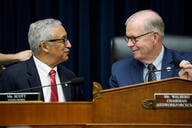You have /5 articles left.
Sign up for a free account or log in.
The U.S. Education Department is looking for the next big ideas in student aid -- with a strong emphasis on promoting simplicity of programs and reaching students in their pre-college years.
Senior department officials invited about 20 experts on student aid -- campus aid administrators and researchers on financial aid -- for a private day of meetings Wednesday. Participants said that the department appears to be thinking ambitiously about changing student aid programs, suggesting that the experts not focus on tinkers, but on how aid programs would be restructured if starting from scratch.
Those in attendance who agreed to talk about the meeting did so only anonymously, saying that they had been told in strong language by the department that it didn't want the meeting to become public knowledge. Department officials confirmed that the meeting took place, but declined to release names of attendees, saying that it wanted to protect the aid experts from appearing to have endorsed any idea that eventually may emerge from the session. Attendees were generally from outside the Beltway -- higher ed association types were excluded -- although Congressional officials were invited to listen to a 45-minute wrap-up at the end of the day.
The secretive session led to some speculation about what the department would be able to do with the results. The reauthorization of the Higher Education Act is still pending, but in the uncertain event Congress takes up the legislation again soon, it will probably be to put a Democratic imprint on the bill, not to add more ideas from the Education Department.
One aid administrator who attended said he had the impression that the department had two goals in mind: looking for "low hanging fruit" on which the department might find a way to act in the short term, while setting out an agenda that might carry weight even in a future administration. Some were also surprised by the department's search for new big ideas, right after the conclusion of the work of the Secretary of Education's Commission on the Future of Higher Education, which has offered a set of goals -- some of them controversial -- for improving American colleges.
Many of the objectives discussed at the session are, at least in theory, things that just about all educators would embrace: encouraging academic rigor at the pre-college level, doing a better job of letting children from low-income families know that aid will be available for them to go to college, and simplifying the aid system so that it is easier for students and their families to understand, and for colleges to administer. Simplicity received a lot of attention, attendees said, reflecting a call from the Spellings Commission for “replacing the current maze of financial aid programs." Sara Martinez Tucker, the under secretary of education, opened the discussion by talking about how important it is to provide the opportunity for all Americans to go to college.
But while access, simplicity and academic rigor are motherhood and apple pie issues, some of the proposals to achieve those goals are sure to be controversial. Nobody favors complexity or confusion as principles in student aid programs. But many college officials fear that with the Bush administration, simplicity doesn't lead to a situation where less is more, but where less is less. One reason eyebrows are being raised among aid experts about all the focus on complexity is this year's budget battle over the future of Supplemental Educational Opportunity Grants, which the Bush administration wants to kill off, while increasing the maximum Pell Grant. This would theoretically result in a simpler system, as both programs help low-income students, but many colleges maintain that this would be a net loss for students in their aid -- an analysis that the Bush administration disputes.
Participants in Wednesday's meeting said that there wasn't any attempt to build support for any particular aid reorganization, but that the plans discussed did at least in some cases amount to major changes from the status quo.
Cheryl Oldham, chief of staff to the under secretary of education, said in an interview Thursday that the meeting was "essentially a conversation with some financial aid experts" and that this was part of "an ongoing process" of looking for ways to carry out the ideas of the commission.
Oldham said that there was no goal of reaching a consensus or emerging with specific propoals. "We don't have an end in mind," she said. She said that the department wanted to invite people "working on this stuff in the field" to the discussion.
Terry W. Hartle, senior vice president for government and public affairs at the American Council on Education, was not at the session and said he wouldn't have expected an invitation. He said he was encouraged by the meeting because the department seemed to be seeking advice from "people who know this stuff cold" and who would have to deal with any changes enacted.
Hartle said that any ideas about simplification of aid programs would almost certainly be the kind of changes that "require a trip through Capitol Hill." So there will be plenty of time to raise any issues, he said.
The essential challenge of talking about simplification is that while everyone agrees with the concept, the details aren't easy to pull off, he said. There are two ways to simplify aid programs, he said: spending a lot more money or a "significant reallocation of resources" away from some programs to others. In the current political environment, spending a lot more money isn't likely, he said, and any reallocation "is going to come from some students or colleges."




